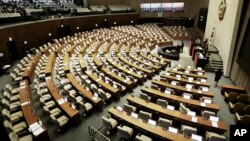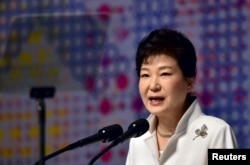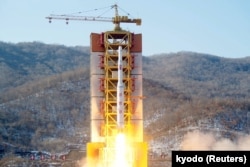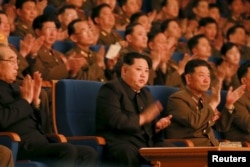South Korea’s main opposition party is set to end the world’s longest filibuster to block a vote on a proposed anti-terrorism bill in the National Assembly.
The marathon filibuster began on February 23 and more than 30 opposition lawmakers have spoken round the clock for seven straight days, easily surpassing the previous world record of 57 hours set by a Canadian party in 2011.
No bathroom breaks
On Saturday one of the filibuster leaders, Representative Jung Cheong-rae, with the main opposition Minjoo Party of Korea, spoke for 11 hours and 39 minutes non-stop.
“My foremost worry during the filibuster was how I could control my bodily functions,” said Jung.
President Park Geun-hye’s ruling Saenuri Party says it will schedule a vote on the controversial bill on Wednesday. The bill is almost assured to pass as the ruling party, which sponsored the bill, controls 157 seats in the 293-member National Assembly.
Upcoming election issue
The filibuster was also blocking a bipartisan deal to redraw electoral districts for the upcoming legislative elections in April. The opposition said they decided to end their holdout now to ensure an orderly election process.
The opposition hopes its high-profile filibuster will help make the conservative Park’s restrictive national security policies and adversarial approach to North Korea key issues in the election.
President Park has said these expanded security measures are needed to deal with the increased threat of terrorism, primarily from North Korea in the wake its fourth nuclear test January 6 and last month’s long range rocket launch.
South Korea's National Intelligence Service (NIS) has warned of the possibility that the North Korean military could carry out acts against the South, including kidnapping or attacking people or targeting subways or power utilities in retaliation for South Korea’s support for increased sanctions against the Kim Jong Un government,
The security bill would establish a new anti-espionage unit focused on preventing a possible attack.
But it would give the (NIS) the authority to monitor private communications and financial records of anyone deemed to pose a security risk, without any court authorized warrants.
Critics say police and security forces already have sufficient powers to prevent terrorism. This anti-terrorism bill, they say, is too invasive and could be too easily abused to restrict peaceful dissent.
"It is North Korea that fired the missile but why is the South Korean government trying to inspect our citizens’ phone records and track down bank accounts of our citizens?” asked Jung.
Undermining democracy
Human rights activists have criticized President Park for attempting to undermine South Korea’s young democracy by banning legitimate protests and using harsh tactics to suppress anti-government demonstrations.
Last year mass labor rallies turned violent when protesters fought police with steel pipes and police used water cannons and barricades to stop the crowd. Some protest leaders were later arrested for inciting violence and holding a demonstration without a permit.
Many of Park’s opponents also disagree with her administration’s refusal to engage with North Korea until it gives up its nuclear program. Seoul’s close alignment with Washington to increase pressure on the Kim Jong Un government to comply with their demands, they say, has only made the situation more dangerous.
Pressuring North Korea
In a speech Tuesday marking Korea’s independence from Japan’s colonial rule, Park said the door is not shut on dialogue with North Korea, but Pyongyang first must change. She did not propose any new talks to improve ties.
In the last decade South Korean public support for engaging North Korea has faded.
Pyongyang’s withdrawal from international nuclear talks in 2009 and refusal to comply with a 2005 agreement to dismantle its nuclear weapons program has greatly increased support for a more conservative and punitive approach to dealing with the Kim government.
Human rights bill
The end of the filibuster will also increase the possibility that the National Assembly will pass a North Korean human rights act intended to document abuses committed by the North Korean leadership.
The two main political parties recently agreed to support the North Korean human rights bill that was first brought up for consideration in 2005. Opponents of the bill say it will alienate the North and complicate peace-building efforts.
In 2014, the United Nations General Assembly backed a resolution to refer North Korea to the International Criminal Court (ICC) for crimes against humanity, based on an extensive U.N. human rights report that documented ongoing and systematic atrocities including a network of political prisons, murder, enslavement, torture, imprisonment, rape, forced abortions and other sexual violence.
China and Russia, North Korea’s allies on the U.N. Security Council, are reportedly blocking that resolution from moving forward.
Youmi Kim in Seoul contributed to this report.















